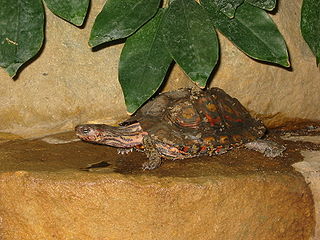
The Geoemydidae are one of the largest and most diverse families in the order Testudines (turtles), with about 70 species. The family includes the Eurasian pond and river turtles and Neotropical wood turtles.

The Australia Act 1986 is the short title of each of a pair of separate but related pieces of legislation: one an Act of the Commonwealth Parliament of Australia, the other an Act of the Parliament of the United Kingdom. In Australia they are referred to, respectively, as the Australia Act 1986 (Cth) and the Australia Act 1986 (UK). These nearly identical Acts were passed by the two parliaments, because of uncertainty as to whether the Commonwealth Parliament alone had the ultimate authority to do so. They were enacted using legislative powers conferred by enabling Acts passed by the parliaments of every Australian state. The Acts came into effect simultaneously, on 3 March 1986.
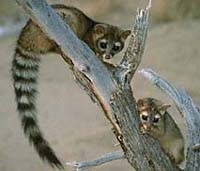
Bassariscus is a genus in the family Procyonidae. There are two species in the genus: the ring-tailed cat or ringtail and the cacomistle. Genetic studies have indicated that the closest relatives of Bassariscus are raccoons, from which they diverged about 10 million years ago. The two lineages of Bassariscus are thought to have separated after only another two million years, making it the extant procyonid genus with the earliest diversification. Prior to the genetic studies, some taxonomies placed the genus as a separate family, Bassaricidae, due to the more digitigrade stance of their legs, and it was thought that they were represented in fossils from the early Miocene. The name is a Greek word for fox ("bassaris") with a Latinized diminutive ending ("-iscus"). The genus was first described by Elliott Coues in 1887. He proposed the word "bassarisk" as the English term for animals in this genus. Its habitat includes semi-arid areas in the southwestern United States, the whole of Mexico, as well as moist tropical forests in Central America.

Livistona is a genus of palms, the botanical family Arecaceae, native to southeastern and eastern Asia, Australasia, and the Horn of Africa. They are fan palms, the leaves with an armed petiole terminating in a rounded, costapalmate fan of numerous leaflets.

Aderus is a genus of leaf beetles of the family Aderidae that resemble ants. The genus was named by John Obadiah Westwood in 1829.

The crested francolin is a bird species in the family Phasianidae. It is well known as the Bospatrys in Afrikaans. It is found in Angola, Botswana, Democratic Republic of the Congo, Eswatini, Ethiopia, Kenya, Malawi, Mozambique, Namibia, Somalia, South Africa, South Sudan, Tanzania, Uganda, Zambia, and Zimbabwe. One of its subspecies, Ortygornis sephaena rovuma, is sometimes considered a separate species, Kirk's francolin.

Bellegarde is a commune in the Gard départment in southern France.

Glyptemys is a genus of turtles in the family Emydidae. It comprises two species, the bog turtle and wood turtle, both of which are endemic to North America. Until 2001, these turtles were considered members of the genus Clemmys, which currently has one member, the spotted turtle.
The 1983–84 Coupe de France was the 67th Coupe de France, France's annual national football cup competition. It was won by FC Metz, who defeated AS Monaco FC in the final.

Voria is a genus of flies in the family Tachinidae.
The Nitrobacteraceae are a family of gram-negative, aerobic bacteria. They include plant-associated bacteria such as Bradyrhizobium, a genus of rhizobia associated with some legumes. It also contains animal-associated bacteria such as Afipia felis, formerly thought to cause cat-scratch disease. Others are free-living, such as Rhodopseudomonas, a purple bacterium found in marine water and soils. The strain Rhodopseudomonas palustris DX-1 can generate an electric current with no hydrogen production, a trait being explored in the development of the microbial fuel cell. The genus Afipia has also been found in the atmosphere, where it uses methylsulfonylmethane as a carbon source.
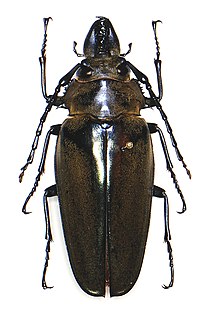
The Trictenotomidae are a small family of beetles in the suborder Polyphaga containing fifteen species in two genera. Most species are found in the Oriental realm where they live in montane forest habitats. The family is considered, based on larval characters as well as sequence-based studies, to be closely related to the Salpingidae.
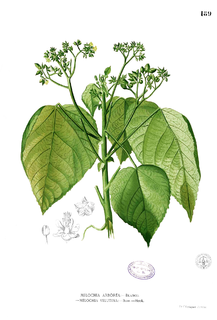
Melochia is a genus of flowering plants in the mallow family, Malvaceae. It comprises 54 species from the tropical and subtropical regions of the world, ranging from India eastwards through Malesia and the Pacific Islands to the Americas and the Caribbean.
The Enterocystidae are a family of parasites in the phylum Apicomplexa.

Marcel Gascoin was a designer who specialized in modular storage units and sets of matching furniture. He played a major role in the emergence of French design after World War II (1939–45). Several of Gascoin's apprentices went on to distinguished careers as designers in their own right.

Avelia Liberty, also known as the Acela II, is a high-speed passenger train built for the North American market by French manufacturer Alstom and assembled in the United States. Amtrak has ordered 28 trainsets for use on its flagship Acela service along the Northeast Corridor between Boston and Washington, D.C., via New York City and Philadelphia.
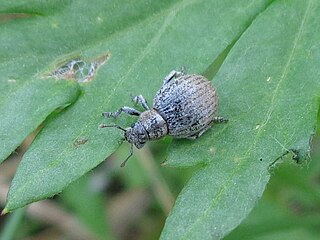
Philopedon is a genus of broad-nosed weevils in the beetle family Curculionidae. There are about seven described species in Philopedon.
The Kirindy serotine is a species of vesper bat in the family Vespertilionidae. It occurs in the central and south-central portions of western Madagascar. As of the most recent IUCN assessment in May 2016, it is of least concern.
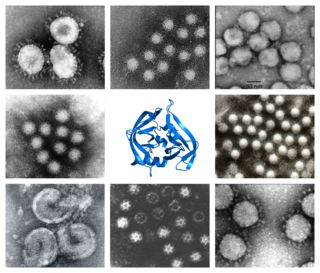
Pisoniviricetes is a class of positive-strand RNA viruses which infect eukaryotes. A characteristic of the group is a conserved 3C-like protease from the PA clan of proteases for processing the translated polyprotein. The name of the group is a portmanteau of member orders "picornavirales, sobelivirales, nidovirales" and -viricetes which is the suffix for a virus class.
Avel de Knight (1923-1995) was an African-American artist, art educator, and art critic. His works are in the collections of the Metropolitan Museum of Art, the Walker Art Center, and the University of Richmond Museums.














